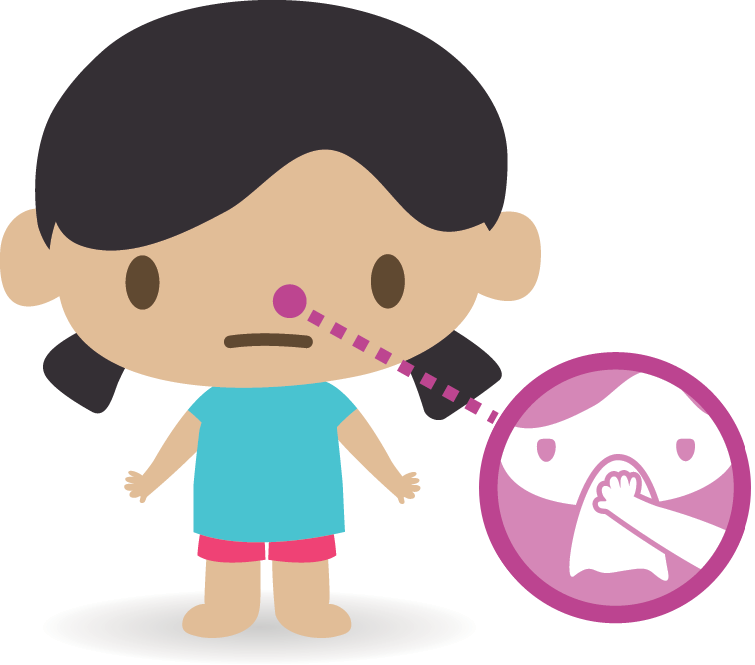Influenza in Children
HEAL

This information has been translated into other languages – see the links at the bottom of this page.
Key Points
- Influenza (also known as the flu) is an illness caused by a virus that easily spreads between people.
- The influenza virus usually affects the nose, throat, and lungs.
- It’s mostly seen in the winter months.
- Influenza is not treated with antibiotics and will usually go away on its own.
- Some people are at higher risk of getting very sick with influenza, including young children (less than 5 years old).
- Pneumonia (lung infection) is the most common complication of influenza.
- A free influenza vaccine is available to anyone in Alberta 6 months of age or older. The vaccine is safe and effective. For detailed information on the influenza vaccine, see these websites:
What Is It?
Influenza (also known as the flu) is an infection that can happen in children or adults at any age. It happens more often in the winter months because people spend more time in close contact with one another. Influenza is spread easily from person to person by coughing, sneezing, or touching surfaces.
Because influenza is a virus, it does go away on its own without antibiotics. However, some people can get very sick with influenza, which is why a vaccine has been created. This is available every year, usually starting in October.
Some children are at higher risk of getting sicker or developing complications from influenza. For example:
- Children with long term heart and lung diseases
- Children with diseases causing weakened immune systems
- Children less than 5 years old
Prevention
Influenza is spread easily from person to person by coughing, sneezing, or touching surfaces. You can protect your children from influenza in two main ways:
- Get the flu vaccine every year.
- Take actions to control the spread of germs:
- Frequent hand washing with soap and water to help limit the spread of influenza. You can use alcohol-based hand sanitizers when soap and water are not available.
- Covering your mouth and nose while coughing or sneezing.
- Avoid touching your eyes, nose, and mouth since germs spread this way.
- Avoid close contact with sick people.
- If you’re sick with a flu-like illness you should stay home for at least 24 hours after your fever is gone.
Influenza Vaccine
Influenza viruses change slightly every year so you need a new influenza vaccine before each influenza season.
People who get the vaccine make antibodies (proteins), which will destroy the influenza virus after the person is exposed to the virus. It generally takes about 2 weeks to make these antibodies. If you do get influenza after getting the vaccine, your symptoms are likely to be milder and last for a shorter time compared with people who did not get the vaccine. It’s best to get the vaccine for you and your family as soon as it’s available in the fall to protect you for the rest of the fall and winter months.
For detailed information on the flu vaccine, see these websites:
Symptoms
Symptoms of influenza can be different from person to person. They include respiratory illness with fever, cough, and one or more of the following:
- sore throat
- headache
- muscle aches and pain
- runny nose
- tired and not wanting to eat or drink
Influenza symptoms usually get better over 2 to 5 days, but the cough and fatigue may last more than a week.
Younger children under 5 years old are at more risk.
Treatment
The treatment of Influenza is focused on improving your child’s symptoms. While this will help your child feel better, it will not make the virus go away faster.
- Rest until the symptoms have fully gone away.
- Have your child drink enough fluids so that they don’t become dehydrated. Find more information on symptoms of dehydration.
- Acetaminophen and ibuprofen are medicines you can use for fever, sore throat, or muscle pain. Find more information on fever.
- Cough medicines aren’t usually helpful. We don’t recommend cough or cold medicine for children under 6 years of age.
Some children need to be admitted into a hospital if they get very sick with influenza. This is usually because of problems with breathing, pneumonia, or dehydration.
When To Get Help
Call 911 anytime you think your child may need emergency care.
Seek immediate medical attention if:
- Your child is less than 2 months old with a fever
- Your child looks ill even after fever medication has been given (very sleepy, confused, irritable, or agitated)
- Your child is having trouble breathing
- Your child is severely dehydrated
- Your child is complaining of headaches with neck pain or stiffness, or light sensitivity
- Your child is lethargic (difficult to keep awake)
Know your options
It can be scary when your child is sick. But in most cases, you don’t need to go to the emergency department. If you’re unsure, visit ahs.ca/options to learn about the options so you can get the care you need.
About AHS HEAL
The Alberta Health Services HEAL (Health Education and Learning) program was created by a team of doctors, nurses, and other clinical staff who work at the Alberta Children’s Hospital and the Stollery Children’s Hospital, to support families and patients with up-to-date and useful information about common childhood health concerns. Learn more at ahs.ca/heal.
To see this information online and learn more, visit: ahs.ca/heal/page14928.aspx

Other languages
Influenza in children: HEAL
For 24/7 nurse advice and general health information call Health Link at 811.
Current as of: March 1, 2024
Author: Pediatric Emergency Medicine, Alberta Health Services
This material is not a substitute for the advice of a qualified health professional. This material is intended for general information only and is provided on an "as is", "where is" basis. Although reasonable efforts were made to confirm the accuracy of the information, Alberta Health Services does not make any representation or warranty, express, implied or statutory, as to the accuracy, reliability, completeness, applicability or fitness for a particular purpose of such information. Alberta Health Services expressly disclaims all liability for the use of these materials, and for any claims, actions, demands or suits arising from such use.
